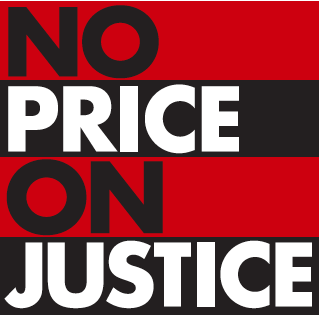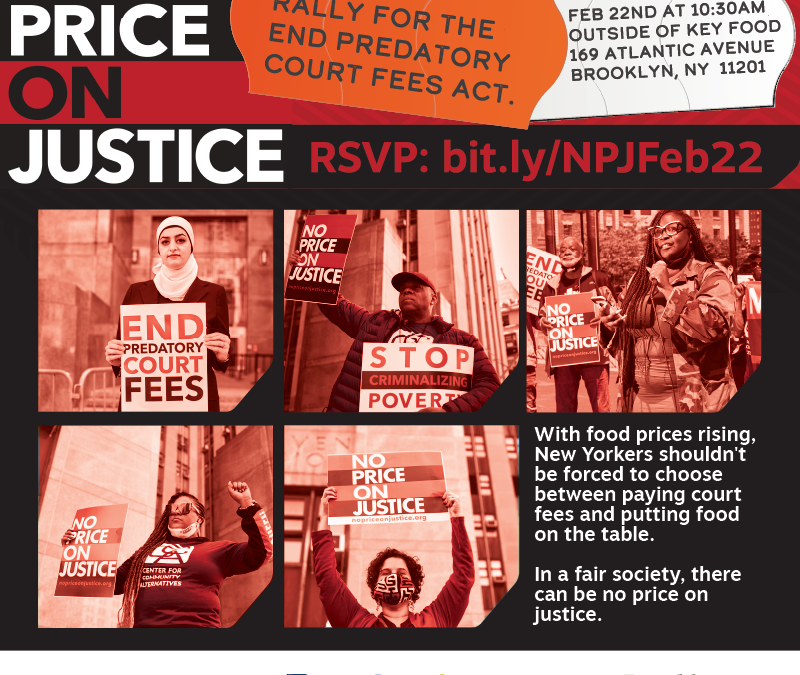**PRESS ADVISORY**
Contact: Katie Schaffer, kschaffer@communityalternatives.org, 646-265-2044
Legislators & Advocates Rally at Brooklyn Supermarket to Call for the Elimination of NY’s Predatory Court Fees
As Food Costs Surge, People with Court Debt Face An Impossible Choice Between Paying Court Fees to Avoid Arrest and Buying Groceries
Holding Egg Cartons and Milk Jugs, Speakers Will Demand the State Legislature Pass the End Predatory Court Fees Act
WHEN: Wednesday, February 22, at 10:30am
WHERE: Key Food Supermarket, 169 Atlantic Ave, Brooklyn 11201 (and available via Zoom livestream here)
WHAT: Outside a Brooklyn supermarket, state lawmakers, advocates, and people with court debt will rally for the passage of the End Predatory Court Fees Act. The End Predatory Court Fees Act, recently re-introduced in the State Senate and Assembly, would eliminate New York’s court fees, mandatory minimum fines, incarceration on the basis of unpaid fines and fees, and garnishment of commissary accounts.
With the cost of basic needs rising, more New York families are facing an impossible choice: whether to put food on the table, or to pay down court debt in order to avoid incarceration and additional fees. In 2022, food prices increased drastically — 10% on average — putting families living paycheck-to-paycheck in a precarious position.
Speakers will demand an end to our state’s dangerous reliance on court fees — an inequitable and inefficient revenue source that traps millions of low-income residents in a vicious cycle of debt and punishment.
WHO: Speakers will include state legislators, as well as impacted New Yorkers and advocates, including:
- State Senator Julia Salazar, sponsor of the End Predatory Court Fees Act
- Assembly Member Kenny Burgos, sponsor of the End Predatory Court Fees Act
- Peggy Herrera, Center for Community Alternatives
- James Innis, New York Communities for Change
- Paula Garcia-Salazar, Legal Aid Society
- Antonya Jeffrey, Fines and Fees Justice Center
BACKGROUND
- The End Predatory Court Fees Act — which would end the state’s mandatory surcharge along with probation fees, mandatory minimum fines, incarceration on the basis of unpaid fines and fees, and garnishment of commissary accounts — was recently reintroduced by State Senator Julia Salazar and Assemblymember Kenny Burgos.
- Dozens of states and localities in states both red and blue have enacted reforms to eliminate fees in recent years.
- New York’s mandatory surcharge was first implemented in the 1980s with the explicit purpose of raising state revenue. Since then, state lawmakers have repeatedly increased the amounts over the years, despite failing to keep legally mandated records on how New York assesses, collects, and distributes this revenue.
- People who can’t afford fees are subjected to punishments that trap them in a cycle of poverty and criminalization: incarceration, prolonged or indefinite supervision, and additional fees — with communities of color and low-income communities suffering the most. New York courts issue thousands of civil judgments and warrants every year, and may even order immediate incarceration for failure to pay.
- A recent report demonstrated that New York’s mandatory surcharge — a supplemental fee assessed in nearly every criminal, traffic, and local ordinance case — is among the most burdensome in all 50 states. New York is one of only four states — along with Alaska, Minnesota and Mississippi — with statutes explicitly providing that an individual’s inability to pay does not exempt them from owing these fees.
- Research shows that some jurisdictions spend more tax dollars attempting to collect fines and fees than they actually receive. At a budget hearing earlier this month, Assembly Member Burgos asked the Chief Administrative Judge Tamiko Amaker whether courts spend more on collection efforts than they take in. Amaker was unable to answer the question.
- Data from the Bureau of Labor Statistics show that the group least able to weather inflation, NYC minimum wage workers, have lost 12.8% of their purchasing power since January 2020.
- During the pandemic, close to one-third of all households surveyed by the Census Bureau reported at least some difficulty in paying household expenses. By October 2022, 47.1% of households reported having difficulty covering basic expenses.
###
About the NO PRICE ON JUSTICE campaign:
No Price on Justice is a coalition of economic and racial justice organizations, grassroots groups, and impacted people working to end New York’s predatory court fines and fees.
Members of the No Price on Justice coalition include: Brooklyn Defender Services, Center for Community Alternatives, Citizen Action, Children’s Defense Fund, Color of Change, Community Service Society, Fiscal Policy Institute, Fines and Fees Justice Center, Legal Aid Society, New York Civil Liberties Union, New York Communities for Change, Partnership for the Public Good, and a dozen other organizations from across New York State.
###


Recent Comments